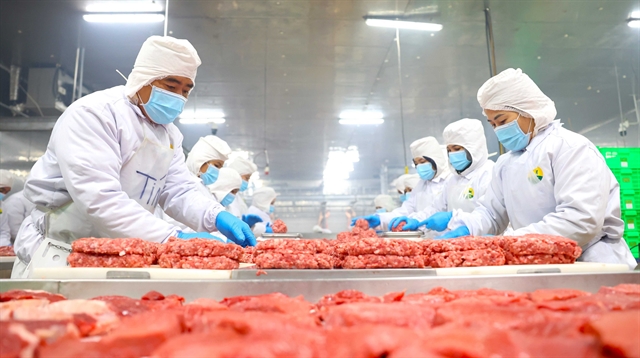 Economy
Economy


|
| A view of VPBank's headquarter in Hà Nội. Photo courtesy of the bank |
HÀ NỘI — Looking solely at the numbers, VPBank experienced a significant decline in its return on equity (ROE) in 2023, indicating ineffective operations, but delve deeper into the reasons behind this sudden drop reveals that it actually presents a competitive advantage for VPBank in the future.
By the end of 2023, VPBank had the largest decrease in ROE among all banks listed on the Vietnamese stock exchange. The bank's ROE ratio declined from 16.0 per cent at the end of 2022 to 9.3 per cent at the end of 2023.
ROE is a crucial metric frequently employed by investors to assess a business's performance. It reflects the profitability generated from shareholders' invested capital. A higher ROE signifies greater operational efficiency. In the period of 2017-22, VPBank consistently fluctuated between 20 and 25 per cent, placing it among the banks with the highest ROE in the system. This operational efficiency is further exemplified by the consistent growth in profits over many years. Over the ten-year period from 2014 to 2023, pre-tax profit multiplied by seven, corresponding to a compound annual growth rate of nearly 24 per cent.
Upon a detailed analysis of VPBank's financial statements, it becomes evident that the primary factor influencing the bank's ROE is not ineffectiveness in operations but rather a significant increase in equity capital during the fourth quarter of 2023. Following a successful private placement of 15 per cent of equity capital to Japanese strategic shareholder SMBC, VPBank accumulated nearly VND36 trillion. This infusion of capital raised the bank's total equity to approximately VND140 trillion, positioning VPBank as the second-largest bank in terms of equity in the market.
Maybank Securities Company, in a report provided to investors at the end of March confirmed that VPBank's decreased ROE in 2023 was primarily attributed to the substantial capital injection in the years 2022-23. Maybank also anticipates that VPBank's ROE will continue to remain at a "modest" level during the period of 2024-26, as the bank will require a two to three year timeframe to effectively utilise its newly acquired capital strength.
Indeed, the significant decline in ROE is a temporary consequence that VPBank must accept following the implementation of a private placement plan for strategic shareholders. In return, VPBank will have access to a capital source exceeding $$1.5 billion at no cost, which will be readily available to support its long-term business plans. In the current landscape, despite the temporary sharp reduction in ROE, it will foster growth momentum for VPBank in the future, given its substantial capital holdings.
During a recent online meeting with investors, Lưu Thị Thảo, Deputy General Director and VPBank's Senior Executive Director, emphasised the importance of a solid capital foundation in banking operations.
She said: "A solid capital foundation is always a prerequisite, enabling the bank to establish a strong footing and weather the most challenging times."
She further highlighted that VPBank's large capital base is a formidable competitive advantage, particularly in a context where many banks in Vietnam are still considered to be capital-deficient.
Thanks to the substantial increase in equity, VPBank is projected to have the highest capital adequacy ratio (CAR) in the system in 2023, reaching 17.1 per cent.
Trần Thái Bình, a market analyst from VPBankS Securities Company, estimates that a 1 per cent increase in the CAR corresponds to a 1.7 per cent increase in the credit growth rate in the subsequent period. Applying this estimation, if VPBank achieves a consolidated credit growth of 25.6 per cent in 2023, the credit growth for 2024 could potentially reach up to 32.4 per cent.
Bình said: "Abundant financial potential will enable VPBank to break through limitations, expanding beyond individual customers, SMEs, and consumer finance, and venturing into new business segments, particularly targeting the FDI customer segment through the strategic partnership with SMBC. This endeavor aims to leverage market opportunities to maximise revenue and profits while supporting traditional business segments."
It is highly likely that VPBank will demonstrate the effectiveness of its capital scale advantage in 2024. In documents sent to shareholders prior to the general meeting, VPBank proposed a plan to more than double its pre-tax profits compared to 2023. Specifically, the parent bank is expected to achieve a profit of VNĐ20 trillion, while subsidiaries including FE CREDIT, VPBankS, and OPES are projected to attain profits of over VNĐ1.2 trillion; VNĐ1.9 trillion and VNĐ800 billion, respectively. — VNS




